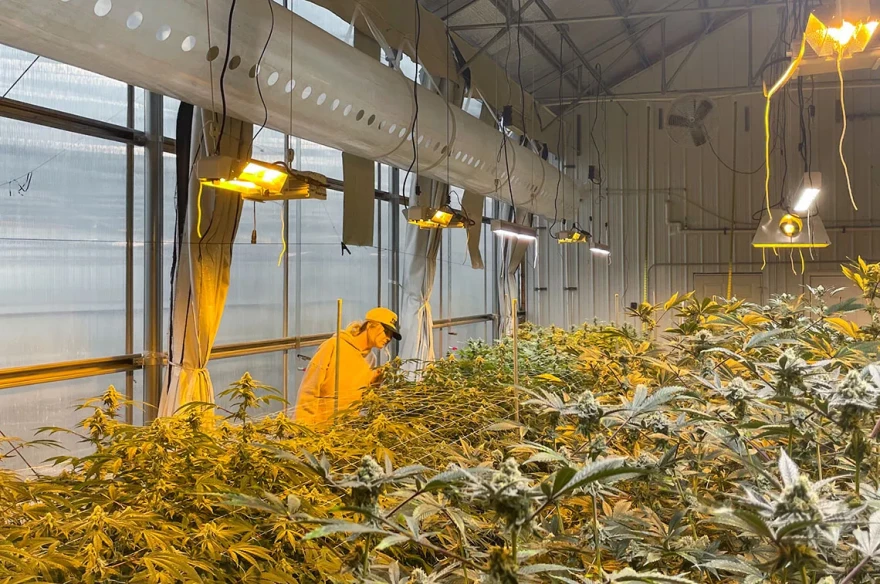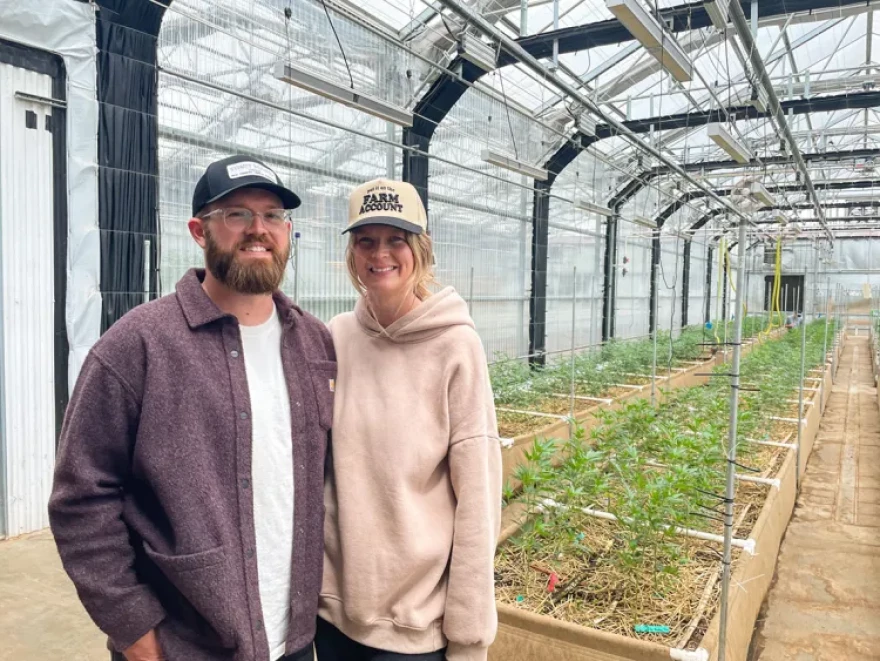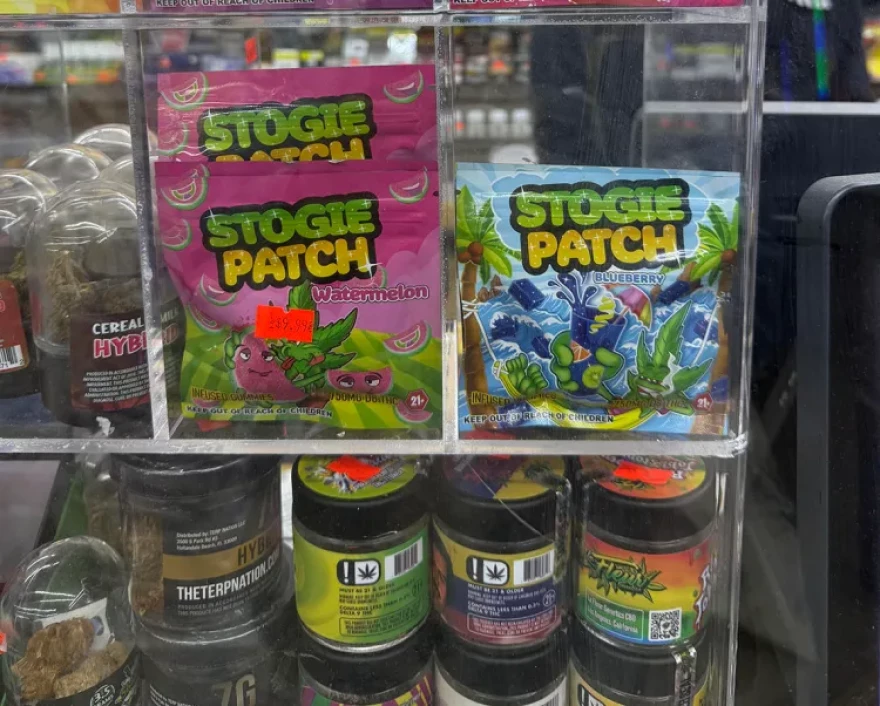RUSHVILLE, Ill. — Justin and Anna Ward of Stoney Branch Farms were anxiously awaiting action on legislation to regulate intoxicating hemp products this spring in Illinois, which would have determined the future of their family-run hemp business in Rushville. But it never came.
Hemp farming has been legal and regulated in Illinois since 2018, when lawmakers passed the Industrial Hemp Act following federal action that legalized hemp production. The legislation anticipated it would again be used to make industrial products, but also for the production of CBD oils that can be extracted from the plant and are marketed as having therapeutic, but not intoxicating, properties.
But hemp has since become the subject of heated debate in Illinois and other states as the plant has been increasingly used to create synthetic products with intoxicating compounds that are not regulated by the federal government. Those products, known as delta-8 THC, are permissible due to what some describe as a “loophole” in the 2018 Farm Bill that legalized hemp production.
Gov. JB Pritzker has been a vocal opponent of intoxicating hemp, saying it undercuts the state’s legal cannabis industry and puts children and teens in harm's way. He’s advocated – thus far to no avail – for regulating intoxicating hemp products similarly to the state’s legalized cannabis industry.
“This regulatory gray area has created a loophole that put Illinois consumers of all ages, but particularly children, in danger while an underground market flourished—the exact opposite of what Illinois has done by regulating our cannabis industry,” Pritzker said in a December 2024 news release.
But lawmakers failed again to pass legislation regulating intoxicating hemp this year, leaving the industry in limbo until either the state acts or the federal government intervenes first. It marked the third consecutive year that a regulatory bill failed, the latest front in a legislative fight that largely pits the state’s legalized cannabis industry against its industrial hemp growers.

Hemp vs. cannabis: What’s the difference?
Both hemp and cannabis come from the same plant and contain a level of THC that can cause a high if ingested. The most important difference, however, is in the concentration of THC. Compared to cannabis, hemp has a much lower amount of naturally occurring THC.
By federal law, if a plant has a concentration of 0.3% THC or less by dry weight, it is legally considered hemp. If it has any more than 0.3% THC, it is considered cannabis.
Both substances were strictly regulated as “Schedule 1” drugs under the federal Controlled Substances Act of 1970 until the passage of the 2018 Farm Bill, which removed hemp from the legal definition of cannabis, thus creating a fully legal hemp market.
But the farm bill only established a threshold for delta-9 THC, the primary cannabinoid found in cannabis. There is no explicit threshold for hemp-derived delta-8, which is created through additional chemical processing after hemp is harvested.
Unlike cannabis products containing THC, which must meet strict regulatory requirements in Illinois and other states that have legalized recreational and medical cannabis, the intoxicating hemp market is currently unregulated and lacks oversight at both the state and federal level to ensure products are responsibly produced, marketed and sold to consumers.
For example, there is no minimum age required to purchase hemp products, making it relatively easy for young consumers to access intoxicating hemp compared to cannabis.
A recent study from the University of Illinois System Institute of Government and Public Affairs released in May found credible evidence that hemp-derived THC products are intentionally marketed and readily available to teens and young adults through online sales and convenience stores.
At least 32 states have responded by passing legislation to increase regulations, or in California’s case, ban intoxicating hemp altogether.
Should it be regulated or banned?
The Wards have grown hemp on their sixth-generation farm since it was legalized in 2018. They’re in the camp that would like to see the intoxicating hemp industry more strictly regulated but not outright banned.
As president of the Illinois Healthy Alternatives Association, a trade association and lobbying group for hemp farmers, Justin Ward has made regular trips to Springfield to advocate for increased hemp regulation.
According to Ward, new regulations should include state-mandated testing to ensure hemp products are compliant with federal regulations and free of toxic contaminants, sold in child-safe packaging and labeling, and have a minimum age requirement at point-of-sale.
“Everything we grow meets that standard,” Ward said. At Stoney Branch Farms, the Wards sell both non-intoxicating and intoxicating forms of hemp, including delta-8. They said the cultivation, processing, packaging and marketing of their products is all done in-house.
Every crop at Stoney Branch goes through a pre-harvest THC potency test by a federal sampling agent, in addition to a post-processing test by a third party to ensure the final products are free of contaminants. The products are then sold online in child-safe packaging to consumers 21 years old or above.

A bill to make these standards law in Illinois, House Bill 1, was proposed this year with the support of hemp lobbyists, but continued disagreement among stakeholders over the details of licensing, taxation and the legal potency threshold of delta-8 THC caused the bill to stall without being called for a vote, according to the bill’s sponsor Rep. La Shawn Ford, D-Chicago.
Municipalities are free to ban the sale of hemp-derived products as they see fit, and many have; in Chicago, the City Council has approved bans specific to some wards.
The state’s legalized cannabis industry, which saw its first sales in January 2020, has at times called for an outright ban on delta-8. The industry maintains it’s willing to work toward a solution.
Tiffany Chappell Ingram, executive director of the Cannabis Business Association of Illinois, said in a recent statement that regulations are needed to “rein in” intoxicating hemp. She argues that the hemp industry unfairly undercuts licensed cannabis operators, evades health and safety regulations and generates little revenue for state programs due to its low tax rate.
“We’ve been at this for years at this point, but we’ve got a lot of great allies in the legislature.” Ward said. “This hasn’t been banned yet because they’ve listened to us.”
Opposition from cannabis crowd
The state’s cannabis industry argues intoxicating hemp is not distinct enough from cannabis to have its own license category and far fewer barriers to entry and operation.
For example, while a three-year license for hemp only costs $1,100, including initial licensing fees, a license for cannabis costs $100,000 just to apply for a large adult-use cultivation license, then another $100,000 when the license is granted and each time it’s renewed. The state caps large-scale adult-use cultivation centers to 21 licenses, and has issued fewer than 100 smaller-scale “craft grow” licenses at a cost of $40,000.
When hemp was legalized, many who couldn’t gain entry to the cannabis industry took it as an opportunity to produce a similar product without all the red tape.
“Part of the reason we were drawn to hemp is the lower barriers of entry to get into this in comparison to the cannabis industry,” Ward said.
Hemp is also taxed at a much lower rate than cannabis, allowing the industry to price its products more competitively. Cannabis revenues, by comparison, are hurt by stricter taxation and regulatory compliance, according to the University of Illinois report.

Social equity cannabis licenses are available at lower costs to those who have been impacted by the state’s prior criminalization of cannabis, including those previously convicted of cannabis related offenses, but the industry is still far from accessible.
Ford, who spearheads the issue of hemp and cannabis regulation each year, said it’s important to balance promises made to current social equity cannabis license holders with any concessions made for hemp.
Ward said he supports easing regulations on cannabis to make the industry more accessible in Illinois, while also keeping hemp accessible through “sensible” regulations.
“We want regulations to protect consumers and weed out bad actors, but we don't want to see this thing regulated to death,” Ward said.
Legislature divided on regulation
The state legislature hasn’t been able to settle the question of whether to regulate hemp-derived products containing delta-8 THC as distinct from medicinal and recreational cannabis, or to treat them as virtually the same substance.
The issue caused a rift among House Democrats earlier this year, and despite continued discussions during the spring legislative session, lawmakers have still not come to a consensus.
A proposal backed by Pritzker in the 2024 session, House Bill 4293, to legally define hemp as cannabis, would have made it illegal to sell hemp without a cannabis license. Hemp lobbyists strongly opposed that measure, fearing it would shut them out and give cannabis license holders a monopoly over the cannabinoid market.
Pritzker ultimately blamed House Speaker Chris Welch for killing that bill in January. Despite bipartisan support, Welch said at the time the measure didn’t have enough votes within his Democratic ranks to pass. A spokesperson for Welch promised at the time that he would continue to work toward hemp regulation throughout the legislative session.
A spokesperson for the speaker declined to comment on why hemp regulations still didn’t advance. Both hemp and cannabis lobbies have donated tens of thousands of dollars to Welch’s campaign, Ford’s and others over the last several years in the legislative blitz surrounding the various regulatory bills.
Ward said Ford has been one of the hemp lobby’s biggest allies. Ford conducted meetings all session among lawmakers, the governor’s office and industry stakeholders in an effort to find common ground.

“We have two competing industries, and we already have existing businesses, and existing businesses are not interested in just losing their operations,” Ford said.
While closed-door conversations surrounding hemp regulations have continued, there has yet to be a public hearing on hemp. Rep. Sonya Harper, D-Chicago, who chairs the House agriculture committee, said the speaker had not responded to her requests for such a hearing.
“I just want to actually make sure that the voices of those most impacted are heard,” Harper said.
Likelihood of future hemp regulation
Though there’s been significant pressure from Pritzker and some advocacy groups to regulate hemp in Illinois, Ford said he’s not inclined to rush the process, arguing it needs broader bipartisan support.
“We had a problem when we regulated cannabis: we sort of rushed it, and we didn't have stakeholders all at the table,” Ford said. “Some Republicans would say that they were not a part of it.”
A number of Republicans have recently joined negotiations over hemp legislation. But a compromise still seems far off. Rep. C.D. Davidsmeyer, R-Murrayville, who’s been leading that effort, said Republicans are unlikely to support anything but closing the intoxicating hemp loophole.
Davidsmeyer said he opposes the double standard for cannabis license holders versus hemp.
“If you're going to have a standard, you have everybody in the same industry going by the same rules,” he said.
A spokesperson from the governor’s office said his position has not changed since he called for greater regulation.
“I think that it's agreed that, from the speaker of the House, the governor and the Republicans and myself, and the industry, everyone agrees that we should regulate this,” Ford said. “Over the months, we should be able to get something. It's a priority.”
Federal changes coming?
A bill that would end this hemp loophole at the federal level passed through the U.S. Senate Appropriations Committee on Thursday, July 10. If that bill becomes law, the cultivation and sale of hemp products containing “quantifiable amounts” of THC would once again be prohibited under federal law, rolling back the previous allowance of 0.3%.
This would deal a devastating blow to the more than $400 million U.S. hemp industry.
One of the most common forms of hemp sold in the U.S. is cannabidiol, or CBD, a non-intoxicating cannabinoid which is marketed as a therapeutic alternative for the treatment of conditions like insomnia, inflammation and seizure disorders.
“That's a big focus of our business still, is people who are looking for some of the therapeutic benefits that cannabis can provide without a high,” Ward said.
Because CBD almost always still has trace amounts of THC, proposals to ban any “quantifiable amount” of THC could result in the prohibition of CBD products. “I think we really do a disservice to a great number of consumers in Illinois by doing that,” Ward said.
Simon Carr is a student in journalism with Northwestern University’s Medill School of Journalism, Media, Integrated Marketing Communications, and a fellow in its Medill Illinois News Bureau working in partnership with Capitol News Illinois.
Isabella Schoonover is a graduate student in journalism with Northwestern University’s Medill School of Journalism, Media, Integrated Marketing Communications, and a fellow in its Medill Illinois News Bureau working in partnership with Capitol News Illinois.
Capitol News Illinois is a nonprofit, nonpartisan news service that distributes state government coverage to hundreds of news outlets statewide. It is funded primarily by the Illinois Press Foundation and the Robert R. McCormick Foundation.
This article first appeared on Capitol News Illinois and is republished here under a Creative Commons Attribution-NoDerivatives 4.0 International License.





